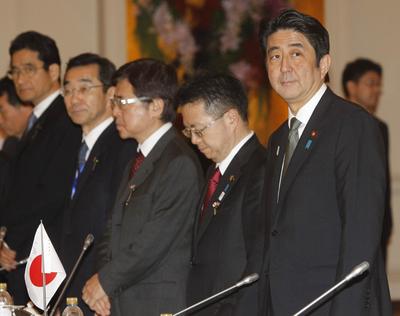The level of trade dependence on China among Asia Pacific countries is also likely to increase. For example, Japan’s trade with China is predicted to increase from 20 per cent of Japan’s total trade to more than 40 per cent by 2030, according to the gravity model.
As power shifts, the liberal order underpinned by the United States as a hegemonic power will have to be restructured. It is time for China and India to be given higher roles and status in global institutions, including financial ones. Truly transforming the structure of the international order has historically been very difficult without a major war — the power transition currently underway is more fundamental than those that occurred following the French revolution or the world wars of the 20th century. But a globalised world will not sustain itself without proper reform of global governance.
A rule-based liberal order can survive the transition. The peaceful resolution of conflicts, international norms on human rights, the role of international law, and other liberal projects should continuously be pursued. But to achieve such goals the world needs both advanced and rising economies, including China and India, to be engaged. US hegemony should not be replaced with a contest between the United States and China for global power. Such a contest would create vicious circles of superpower competition and compromise, in which the interests of smaller states are sacrificed and liberal norms are not applied to all players equally.
In other words, a G2 world would weaken the unity of the liberal international order and American partnerships, and encourage neighbours and trading partners to band with China as the regional hegemon in continental Asia. Instead, the world needs a flatter, not more hierarchical, consortium such as the G20, where major powers deem it in their interests to gather, discuss problems and share the burden of leadership.
It is clear that China has the potential to behave aggressively, breaking rules and norms due to its unique values and political regime. But China and other autocracies could be transformed if proper guidance and pressure is applied. For that purpose, it would be useful to create a second united complex of advanced democratic economies including the United States, Europe, Japan, Australia, Canada and South Korea. Since these economies share political values they can commit to sustaining a liberal international order.
Without such a complex to set standards, China and other rising economies could be let off the hook. They could keep refusing responsibility in global governance on issues like climate change, economic liberalisation and human rights.
Soft power, including diplomatic skills and the power of visionary imagination, would be their biggest asset in creating soft pressure on China and others to meet basic international norms.
A recent report, ‘Japan as the Rule-Promoting Power’, shows how Japan could play a central role in such a coalition. It is still uncertain which bodies of governance would take central roles under such an arrangement, but the creation of this coalition should be regarded as more important than regional groupings in any forum.
The task ahead for democracy is to reform established political systems to encourage responsible, not populist, government. Japan would be the best test case: its advanced democracy with the most rapidly ageing society now suffers from a lack of social consensus and a defective parliamentary system. Without successful reform and growth in advanced democracies, democracy will lose its appeal to transitional economies where the democratic process is still under development. Autocracy historically works better to force people to sacrifice their interests and lives for the good of the state. But while autocratic states may experience economic success, their citizens do not enjoy a fair distribution of prosperity or a social safety net.
The rise of the rest is welcome — as long as it leads to better living standards and human dignity for the people residing in these countries. But without a clear vision of the new world order, the classical era of great power competition could return. The democratic world should be confident in the values of liberalism and democracy — and be willing to defend them.
Ryo Sahashi is an Associate Professor of International Politics at Kanagawa University and research fellow of Japan Center for International Exchange.
A version of this article was first published here on Global Trends 2030.


I think this prediction will change in case of a systemic war. In my opinion Beijing is developing a external behavior and foreign policy of hegemonic base; for that reason it is very probable China is route to collision with USA. But if this situation wouldn’t happen (remember that G. Friedman considers, in his book “The Next 100 Years”, that the central war will be around 2040), China confront important and complex domestic challenges that will affect the internal political, economic and social stability.
I think it is a mistake to consider that the only course of China is the present development path; while Japan is country and society more stable.
Is the current right-wing administration in Japan likely to be predisposed to promote liberal international institutions whilst they are busily trying to return Japan to its place in the sun?
I’d thought their focus was on territorial claims, promoting Japanese nationalism and recovering from Japan’s lost decades of economic growth?
With the recent antagonism of China (and Taiwan) by Japan (and vice versa)is Beijing likely to listen to Toyko or Washington when they promote liberal institutions?
Especially if and when the objectives of these institutions compromise China’s economic objectives?
Japan-China-Taiwan Island dispute:
http://worldnews.nbcnews.com/_news/2012/09/25/14087094-taiwanese-ships-clash-with-japanese-coast-guard-over-disputed-islands?lite
http://www.washingtonpost.com/world/national-security/new-japanese-prime-minister-to-visit-white-house-in-february/2013/01/19/8addad04-61ff-11e2-81ef-a2249c1e5b3d_story.html
Japan-Korea Island Dispute:
http://www.nytimes.com/2013/01/18/world/asia/american-envoy-calls-for-cooler-heads-in-asian-island-dispute.html?_r=0